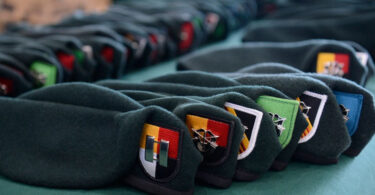The Government Accountability Office that “provides Congress, the heads of executive agencies, and the public with timely, fact-based, non-partisan information that can be used to improve government and save taxpayers billions of dollars” is now instead investigating whether government agencies are woke enough.
In a recent GAO press release, they are not concerned whether the US military service academies have the best qualified students but rather what skin color the cadets have.
Then they lament that there are not enough women in military SPECIAL OPERATIONS!
Here is the recent GAO press release:
On this day, 75 years ago, President Truman signed an executive order that would forever change the military. Executive Order 9981 banned segregation in the armed forces and called for the abolition of discrimination on the basis of race, color, religion, or national origin in the military.
In the years since, the Department of Defense (DOD) has expressed a commitment to promoting an environment free from discrimination.
But the military still faces a number of challenges in meeting the goals of Truman’s executive order.
Today’s WatchBlog post looks at some of our recent work on how DOD is addressing the issue of discrimination in the military academies, which serve as a key recruitment pipeline for military service, as well as in the special operations community.
Diversity and discrimination in military service academies
The U.S.’s three military service academies (Army, Air Force, and Naval) play a key role as a pipeline for military services as well as in shaping leaders for a diverse military.
But the student population at the academies doesn’t currently reflect the diversity of the rest of the nation.
Non-white cadets accounted for between 36% and 40% of the military service academies’ student body in the fall of 2021. For comparison, the overall U.S. non-white undergraduate college population was 50% in the fall of 2020.
In our work, we found that the academies had taken some actions to improve their organizational climate.
For example, the academies had taken steps to expand the pool of qualified, diverse potential students and new faculty, and have assigned resources dedicated to equal opportunity.
However, the academies had not developed any measures to assess whether their actions had improved organizational climate as intended. As a result, we recommended they do so.
We also reviewed how the service academies handle issues of discrimination. If a student within these academies experience discrimination or harassment, they can file equal opportunity complaints.
But we found that incidents not submitted through this system aren’t always fully captured in data schools use to understand the problem.
This could mean that military academies do not have a clear understanding of the frequency of discrimination or harassment or the best information on how to address them. We recommended they do so.
Women in combat and Special Ops
Women have served in ground-combat roles, including those in U.S. Special Operations Forces, since 2013. But despite this decade of service, they continue to face lower representation and discrimination.
The percentage of women servicemembers in the U.S. Special Operations Command (SOCOM) increased from 7.9% to 9.8% from FY 2016 to 2021.
However, this percentage is still low compared to women’s representation in the military overall, which was about 19% in FY 2021.
DOD has expressed a commitment to promoting an environment free from barriers that may prevent underrepresented groups, including women, from rising to the highest levels of responsibility.
But forms of bias continue to exist within SOCOM, creating barriers to accessing a broad range of talent, skills, and perspectives.
DOD has policies to prevent and respond to incidents of gender discrimination.
However, in 2022, we found that some of the military service branches’ polices do not align with DOD polices. This lack of alignment could lead to inefficiencies in DOD’s ability to process gender discrimination complaints.
We also found that SOCOM has limited access to data on incidents of gender discrimination. Having greater access to this data would better position SOCOM leadership to identify trends and guide appropriate action to address gender discrimination incidents.
As a result, we recommended that DOD enhance SOCOM’s access to personnel data—including data on incidents of gender discrimination—to support DOD’s efforts to identify and address barriers to women’s service in SOCOM.
Building for an Inclusive Future
As DOD seeks to implement and maintain inclusive policies, the department will need to improve its existing practices for assessing how it manages gender discrimination incidents in settings where multiple service branches are located (also known as joint environments) and discrimination-related data.
We plan to continue tracking DOD’s progress in addressing discrimination challenges.
- Comments on GAO’s WatchBlog? Contact blog@gao.gov.








Leave a Comment